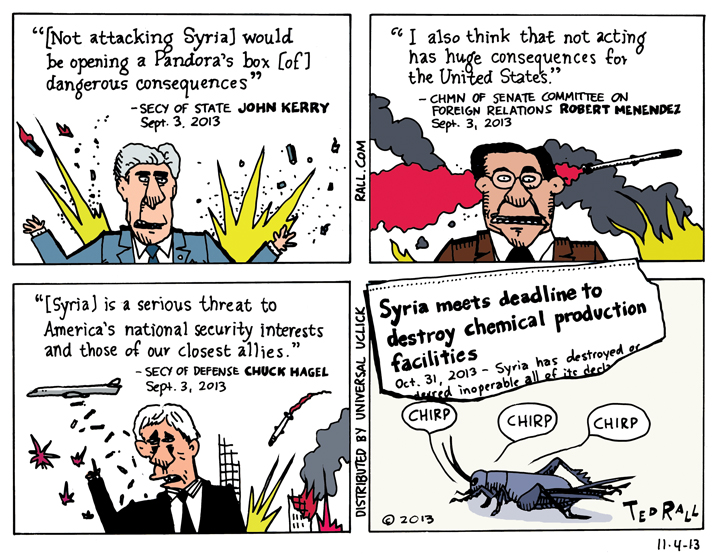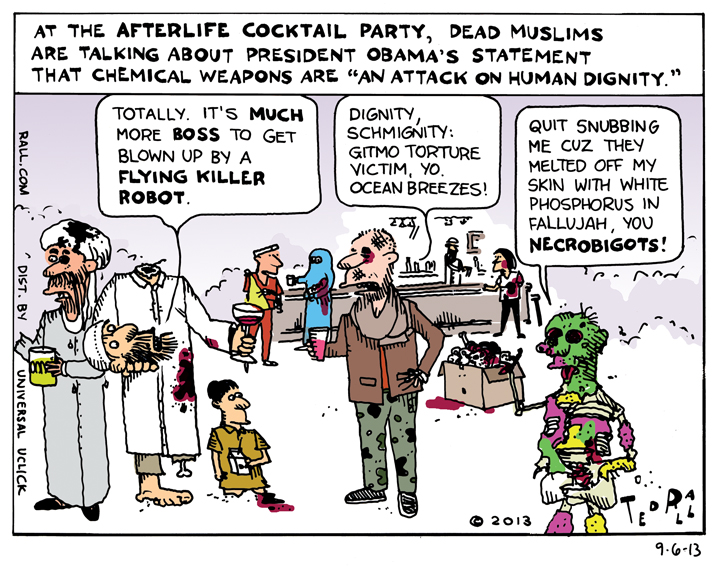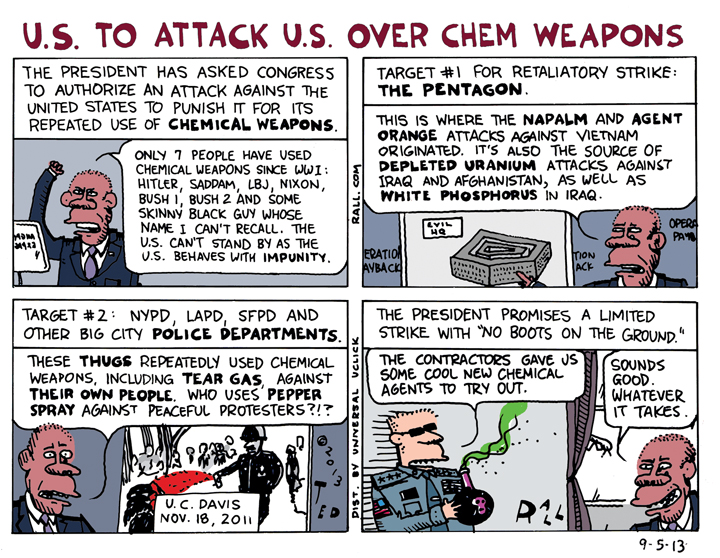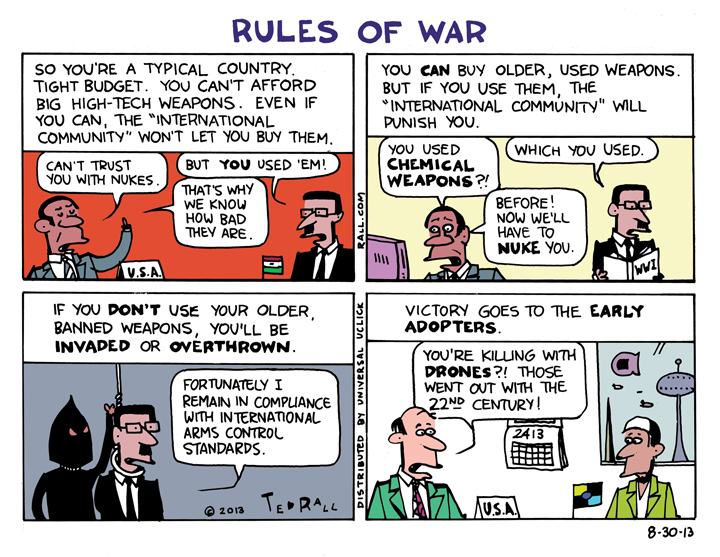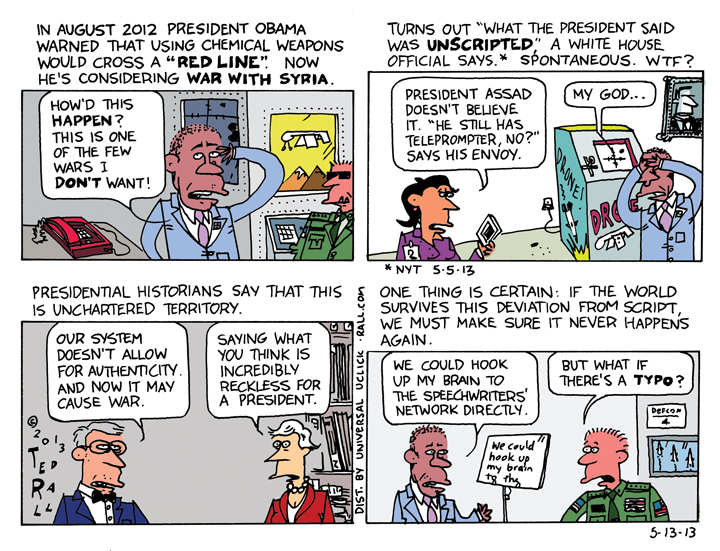Back in September, Obama Administration officials said that Syria’s chemical weapons represented a grave threat to the United States and that they could never be eliminated without going to war. Now it’s November, and Syria is meeting its obligations to do so…yet the U.S. never went to war. Could it be that war is not always the answer?
Guest Post: Obama’s Speech.
Susan here. This is a quote from Obama’s speech:
“To my friends on the left, I ask you to reconcile your belief in freedom and dignity for all people with those images of children writhing in pain, and going still on a cold hospital floor. For sometimes resolutions and statements of condemnation are simply not enough.”
My response is this:
Fuck you, Obama. Fuck you for trying to come to us on the Left when you need us, and then shitting on us when you don’t. You do NOT have my permission to bomb Syria, and you will NEVER get it. You will NOT get my permission to bomb Syria based upon a YouTube video that conveniently surfaced just as the UN weapons inspectors were checking into their Damascus hotel. There are hundreds of videos of the so-called Syrian opposition al-Qaeda “rebels” committing atrocities like beheading Christians, practicing cannibalism, and sawing a little girl’s arms and legs off while she is still alive. And yet, we are supposed to ignore these atrocities and focus on the one (conveniently-timed) atrocity that Assad would never actually be stupid enough to commit.
I am tired of your patronization. I am tired of your lies. I am tired of looking at your face. I am tired of hearing your voice. And I’m tired of you trying to soften up Syria for the kill, and slouching us inch by inch into World War III. Because unlike Libya in 2011 and Iraq in 2003, Syria has allies, allies who are likely to retaliate. If Iran retaliates, the price of oil will go sky high, and we will freeze in winter-time, and the price of just about every product will go up due to the higher cost of shipping. Because 50% of the world’s oil comes from the Persian Gulf. I shouldn’t have to tell you this, Mr. Obama. That’s what you pay that useless Cabinet of yours to do.
But since you did address Leftists such as myself in your speech, I will tell you this: The US used chemical weapons in Vietnam (Agent Orange), and used them again in Iraq and Afghanistan (White Phosphorus, Depleted Uranium). So we are in NO position to lecture others on the use of chemicals as weapons. People who live in glass houses shouldn’t throw stones.
SYNDICATED COLUMN: Breaking Bad
Obama’s Illegal War Against Syria
Barack Obama wants to fire cruise missiles at Syria. As president of the nation whose military possesses the most lethal firepower of any society in history, he obviously has the ability to start this war — his sixth major front, after Afghanistan, Iraq, Yemen, Libya and Pakistan — if he wants to. But does he have the legal right?
The answer is no. Not if the basic architecture of the Constitution, the separation of powers, remains in force. Not if the Founding Fathers’ originalist intent, and their understanding of English at the time, means anything. Not if America’s treaty obligations, which after ratification carry the full force of U.S. law, are more than pieces of paper.
Might makes right; the victor writes history. No doubt, in the perhaps-not-so-distant future, if the United States is formally constituted as an empire, with Syria one of its outlying provinces or a vassal state, no one will care how it went down back in 2013. Until then, however, it matters a lot. Attacking Syria without legal basis would have broad implications, and not just for the Syrians who will lose their lives, limbs and sanity.
Back here in what neofascist politicians and media mouthpieces call the Homeland, we Americans are watching our top officials and boldface notables brush off the basic legal underpinnings of the political culture with impunity.
Obama and his allies’ disdain for the law probably won’t spark much street protest, much less an uprising. (These days, you have to be a white Republican to provoke a demonstration against your wars.) Nevertheless, official lawlessness is corroding the system, hastening the coming rebellion just as surely as rust will eventually cause a bridge to collapse. When those at the top don’t follow their own rules — rules that they wrote, rules from which they benefit the most — why should anyone else? “They say I got to respect the system,” the Australian punk band the Saints sang, “but there ain’t no respect in that system for me.”
Obama and the other warmongers are counting on ignorance and confusion to make their case, but the rules of war are clear.
Attacking Syria would be illegal.
Obama and his surrogates keep saying that Obama has the “inherent power” to attack Syria (or any other country) in his role as commander-in-chief. He’s only asking Congress for approval, he says, because he’s a nice guy (and the political cover doesn’t hurt if and when the war turns sour, as they usually do).
In The Federalist Papers, Alexander Hamilton explained the thinking behind the new Constitution to 18th century newspaper readers. The president’s role as “commander-in-chief” was nothing close to the lofty Caesar-like rights Obama claim. So ceremonial as to be virtually insignificant, the commander-in-chief gig barely rated a mention: “While [the powers] of the British kings extends to the declaring of war and to the raising and regulating of fleets and armies,” Hamilton explained, “all which, by the Constitution under consideration, would appertain to the Legislature [Congress].”
In his book War Powers: How The Imperial Presidency Hijacked the Constitution, Peter Irons reminds us that under the U.S. Constitution, the president’s only military role is to repel an invasion — after it has occurred! — pending action by Congress. “The Framers,” writes Irons, “agreed that the president could act without a congressional declaration of war to repel an invasion but that only Congress could authorize the deployment of forces outside the nation’s territory in combat against foreign troops.”
The Founders were split on a number of issues. Slavery, for instance. On separation of powers and making war, they were virtually unanimous. Only a single delegate voted to vest the president with the right to wage war.
Obama has no “inherent right” to attack Syria or any other country.
Under the Constitution, Congress could do it. But the U.S. is also subject to treaty obligations that clearly block it from attacking Syria under present circumstances.
The Kellogg-Briand Pact of 1928, which the U.S. Senate ratified by an 85-1 vote, bans all acts of military aggression. Many of the Nazi leaders executed and imprisoned at Nuremberg were convicted for violating this Pact. It remains in force as international law.
The U.N. Charter mandates that all U.N. member states “refrain in their international relations from the threat or use of force against the territorial integrity or political independence of any state.” The Charter does not make exceptions for the three principal arguments Obama makes in favor of attacking Syria: punishment (for using chemical weapons), preemption (it’ll send a message to other possible future chemical weapons users, such as Iran and North Korea) and deterrence (it will deter Assad from attacking Jordan or Israel). To the contrary, the Fourth Geneva Convention outlaws “collective punishment” in which civilians are targeted to suffer for the offenses of their government.
During George W. Bush’s propaganda offensive leading to the 2003 invasion of Iraq, Bush and his allies (many of the same figures pushing to attack Syria) successfully convinced the public to sign off on their “preemptive war.” But neither Iraq then, nor Syria now, comes close to fitting the bill legally.
“There’s a well-accepted definition for preemptive war in international law,” Joseph Cirincione, Director of the Non-Proliferation Project of the Carnegie Endowment, said in late 2002. “Preemptive war is justified by an imminent threat of attack, a clear and present danger that the country in question is about to attack you. In such a case a preemptive attack is recognized as justifiable.”
That’s a very high bar. Even troops massed on your border don’t automatically qualify as an imminent threat under international law. You have to let the enemy hit you first, or have strong reason to believe they’re about to do so.
Now Obama can argue — and others will — that Geneva, Kellogg-Briand, the U.N. Charter, and even the U.S. Constitution are quaint, outdated relics, written by naïve men whose 20th century attempts to outlaw war are irrelevant today. If that’s what they think, then they should convince us to amend or annul them.
As long as these laws remain in force, and as long as Obama and other members of America’s ruling class continue to ignore them, an ugly day of reckoning draws closer.
P.S. to Mr. Obama: Please, Sire, may we miserable subjects of your Benevolent Self kindly see proof that the Syrian government (and not the rebels) carried out that poison gas attack the other day? How about some evidence?
Anything?
(Ted Rall’s website is tedrall.com. Go there to join the Ted Rall Subscription Service and receive all of Ted’s cartoons and columns by email.)
COPYRIGHT 2013 TED RALL
Guest Post: Bravo, Rush!
Susan here. Rush Limbaugh has recently come out as against war on Syria, stating that the “damning” chemical weapons incident was staged by the so-called “rebels”. This is true, and I hope radical truth-telling on Rush’s part becomes a pattern in the future.
I’m not holding my breath, though.
SYNDICATED COLUMN: 7 Questions You Should Ask About Syria
Lightening-Quick Obama Makes Bush’s “Rush to War” Look Slow and Methodical
Ten years ago, George W. Bush and his henchmen were beginning their war against Iraq. They wanted to invade hours after 9/11. But conning Congress and the public into invading a country that posed no threat to us delayed the invasion until March 2003. This week, as the media celebrates the 50th anniversary of the March on Washington and Martin Luther King’s iconic speech, it is shock- and awe-inspiring to see how far America has come. Where it took a white president a year and a half to pour on enough lies of omission, contextual lapses and leaps of logic to gin up a stupid, illegal war in the Middle East, our black president did it in a week.
Here we go again. A Baathist autocrat is in American crosshairs. The justification: WMDs. Also, he “kills his own people.” Which we haven’t cared about before. But: WMDs.
Ten years ago, the Baathist tyrant of Iraq denied the WMD accusations and invited UN weapons inspectors to verify his claim. Which they did. Because he was telling the truth. But the Bushies didn’t want to wait. No time! Had to invade right away!
And: again. “At this juncture, the belated decision by the regime to grant access to the UN team is too late to be credible,” an Obama official said five days after Syrian troops allegedly fired poison gas into a neighborhood on the outskirts of Damascus, killing over 1000 people.
“Too late”? Really? Assad’s government OKed the inspection less than 48 hours after the UN asked. On a weekend. I have editors who don’t get back to me that quickly. Doesn’t seem like a slow response from a government that doesn’t have diplomatic relations with the U.S. Also, they’re kinda busy fighting a civil war.
Now is a good time to think about some things the American mainstream media is omitting from their coverage — concerns strikingly similar to issues that never got discussed back in 2002 and 2003.
1. “Chemical weapons were used in Syria,” Secretary of State John Kerry says. Probably. But by whom? Maybe the Syrian army, maybe the rebels. Experts tell NPR: “The Free Syrian Army has the experience and perhaps even the launching systems to perpetrate such an attack.” Maybe we should ease off on the cruise missiles before we know which side is guilty.
2. Assuming the attack was launched by the Syrian army, who gave the order to fire? Maybe it’s Assad or his top generals. Assad denies this, calling the West’s accusations “nonsense” and “an insult to common sense.” Which, when you think about it, is true. As Barbara Walters and others who have met the Syrian dictator have found, Assad is not an idiot or a madman. He is a well-educated, intelligent man Why would he brush off Obama’s “red line” about the use of chemical weapons last year? His nation borders Iraq, so it’s not like he needs reminders of what happens when you attract unwanted attention from the U.S. Why would Assad take that chance? His forces are doing well. If the attack came from Assad’s forces, maybe it originated on the initiative of a lower-level officer. Should the U.S. go to war over the possible actions of a mid-ranked army officer who went rogue?
3. “The options that we are considering are not about regime change,” says the White House PR flack. So why is Obama “days away” from a military strike? To “send a message,” in Beltway parlance. But the air war that the attack on Syria is reportedly being modeled after, Clinton’s campaign against Serbia during the 1990s, caused the collapse of the Serbian government. Regional players think, and some hope, that degrading Assad’s military infrastructure could turn the war in favor of the Syrian rebels. If toppling Assad isn’t Obama’s goal, why chance it?
4. When you bomb one side in a civil war — a side that, by the way, might be innocent of the chemical attack — you help their enemies. Assad is bad, but as we saw in post-Saddam Iraq, what follows a dictator can be worse. Syria’s rebel forces include radical Islamists who aren’t very nice guys. They’ve installed Taliban-style Sharia law in the areas they control, issuing bizarre edicts (they’ve outlawed croissants) and carrying out floggings and executions, including the recent whipping and fatal shooting of a 14-year-old boy for making an offhand remark about Mohammed. Obama is already sending them arms and cash. Should we fight their war for them too?
5. Why are chemical weapons considered especially bad? Because the U.S. has moved on to other, more advanced ways to kill people. And because we claim to be exceptional. Paul Waldman of The American Prospect notes: “We want to define our means of warfare as ordinary and any other means as outside the bounds of humane behavior, less for practical advantage than to convince ourselves that our actions are moral and justified.” And, as Dominic Tierney argued in The Atlantic, “Powerful countries like the United States cultivate a taboo against using WMD partly because they have a vast advantage in conventional arms.” If 100,000 people have died in Syria during the last two years, why are these 1000 deaths different?
6. White phosphorus is a chemical weapon that kills people with slow, agonizing efficiency, melting their bodies down to their bones. The U.S. dropped white phosphorus in Iraq, notably in the battle of Fallujah. The U.S. uses depleted uranium bombs in Afghanistan. Those are basically chemical weapons. The U.S. uses non-chemical weapons that shock the world’s conscience, such as cluster bombs that leave brightly colored canisters designed to attract playful children. Assuming the Assad regime is guilty as charged of the horrors in Damascus, why does the U.S. have the moral standing to act as jury and executioner?
7. Why us? Assuming that military action is appropriate in Syria, why is the United States constantly arguing that we should carry it out? Why not France, which has a colonial history there? Or Turkey, which is right next door? Or, for that matter, Papua New Guinea? Why is it always us?
Because our political culture has succumbed to militarism. Which has made us so nuts that we’ve gone from zero to war in a week. Which brings up a quote from the “forgotten MLK,” from 1967: “I knew that I could never again raise my voice against the violence of the oppressed in the ghettos without having first spoken clearly to the greatest purveyor of violence in the world today — my own government.”
Some things never change.
(Ted Rall’s website is tedrall.com. Go there to join the Ted Rall Subscription Service and receive all of Ted’s cartoons and columns by email.)
COPYRIGHT 2013 TED RALL

